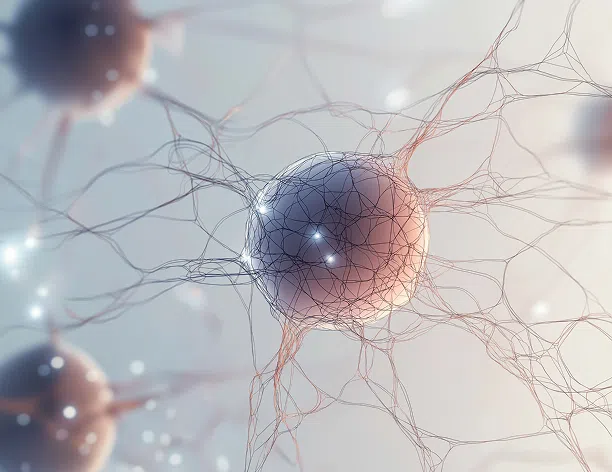
Our history
For over 40 years, Bioprojet has been developing innovative treatments driven by scientific research. Founded to create a bridge between fundamental science and medical practice, the laboratory collaborates with Inserm and several academic laboratories specialized in medicinal chemistry. This dynamic continues today, with an unwavering objective : to improve patients’ lives.
#BIOTECH
BRIDGING ACADEMIC AND INDUSTRIAL WORLDS
Bioprojet, a research-based company, was founded in 1982 by Jeanne-Marie Lecomte and Jean-Charles Schwartz, both holding doctorates in pharmacy and science. With distinct backgrounds—Lecomte from the pharmaceutical industry and Schwartz from academia—they set out to bring academic research closer to industrial pharmaceutical development, a rare approach at the time.
With Bioprojet, they pursued a clear ambition : to rely on original work in fundamental research to design and develop first-in-class drugs that would pave the way for entirely new therapeutic categories.
CONTINUOUS GROWTH OF THE GROUP
In 2001, Bioprojet acquired GSK’s research center in Saint-Grégoire, near Rennes, where it consolidated its own researchers with local scientific teams and reorganized the facility.
The objective : to design innovative medicines and conduct their preclinical evaluation. Each year, approximately one thousand molecules are designed and assessed at the site.
The group has also expanded by acquiring marketing licenses for drugs aligned with its areas of expertise :
In 2013, Bioprojet acquired the British company Lincoln, which held the global rights to Anapen®.
Since the early 2000s, Bioprojet has also been structuring its international presence by establishing subsidiaries, primarily in major European countries.
Today, Bioprojet has a commercial presence in 17 countries, reflecting its ambition and commitment to delivering innovative medical solutions on a global scale: France, Germany, Austria, UK, Ireland, Belgium, Netherlands, Luxembourg, Switzerland, Italy, Spain, Portugal, Sweden, Denmark, Norway, Finland, and Tunisia.
The group intends to further strengthen its model of focused research strategy and expand its international presence—either directly or through strategic partnerships.
In the United States, Bioprojet partners with Harmony Biosciences, which markets Wakix® and is developing several ongoing research programs.
INTERVIEW WITH THE FOUNDERS

Dr Jeanne-Marie LECOMTE
Bioprojet is an original, unconventional pharmaceutical company that Professor Schwartz and I founded in 1982, united by a shared philosophy and vision of pharmaceutical research. It is unconventional because it was created directly from fundamental research—something quite unusual at the time.
More than a century earlier, Pasteur had already expressed this notion when he said, “There are not two kinds of science: basic science and the applications of research, which are linked to one another like the tree and the fruit it bears.”
This principle is even more pertinent to drug discovery, which must begin as far upstream as possible—where physiological and pathophysiological mechanisms are deciphered—and must be inherently multidisciplinary.
Starting from novel biological targets that we suspected played a role in pathology, we set out as early as the 1980s to identify, in a rational manner, new therapeutic classes that could benefit public health.
After ten years of research and development, we devised a first, entirely original molecule in a field that had seen no innovation for a very long time : we discovered a pure intestinal anti-secretory agent that inhibits hypersecretion in diarrhea.
From this initial product, Tiorfan®, we went on in 1992 to create a second company, the Bioprojet Pharma laboratory.
Indeed, within just two years, Tiorfan® became the market leader in its indication because it truly brought something new. Today, it is developed, approved, and marketed in over 70 countries.
This success enabled us to continue our research and development strategy and, fortunately, to acquire the Bioprojet Biotech research laboratory in 2001.
Bioprojet has now entered a new phase : international expansion. We remain ambitious while staying true to our core mission—research and innovation. Through this commitment, we hope to continue fulfilling our purpose in the service of patients.

Pr Jean-Charles SCHWARTZ
The guiding principle of the entire organization is to work around a clearly defined biological target. To do this, the first step is to produce the target itself. This is the role of the Molecular Biology Unit, which uses modern molecular genetics techniques to produce recombinant receptors and enzymes. These recombinant proteins enable in vitro testing of molecular interactions with their target.
The second unit is a Chemistry team dedicated to designing candidate compounds capable of interacting with the defined target. To achieve this, the target is first analyzed using molecular modeling. Even without crystallizing the target, it is now possible—by analogy with similar targets—to build a theoretical three-dimensional model of the protein and test, in silico, the interaction between the molecule and the target. These virtual screenings guide the chemical synthesis. Using conventional synthetic methods, the chemists then produce compounds likely to exert a therapeutic effect.
Next, a selection of promising molecules must be tested. This is carried out by the Pharmacology team, which evaluates the effects of the new compounds on animals or animal tissues to identify potential therapeutic indications.
Finally, the Pharmacokinetics team quantifies the compound using advanced analytical methods and monitors its kinetics in tissues. This helps determine the drug’s duration of action, appropriate dosage, and, ultimately, contributes to the final selection based on pharmacokinetic parameters.
It is indeed a complex process, but the key advantage of our research center lies in the small, highly interactive teams. This close collaboration fosters strong synergy and allows for great flexibility—programs can be adapted and redirected with ease.
We took over the center in 2001, and since then, my colleagues and I have built a remarkable facility, whose performance—validated by the results achieved—is widely recognized. Its efficiency is comparable to that of centers with hundreds of researchers.
I am extremely proud of this accomplishment, and I hope it will continue to contribute both to public health advancement and to the success of Bioprojet.

